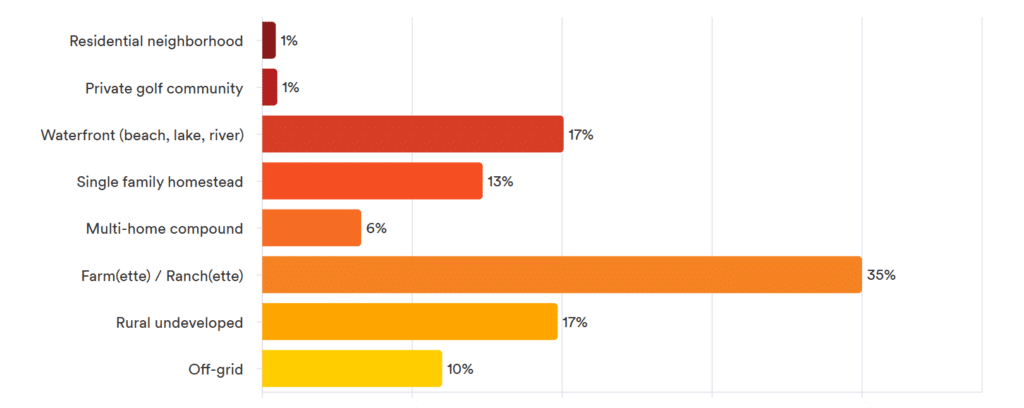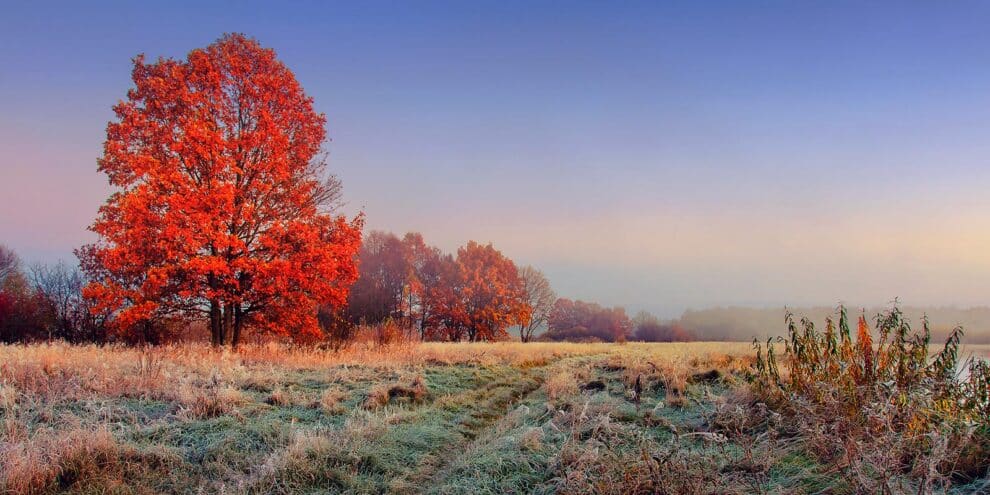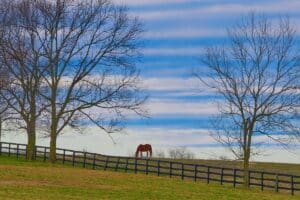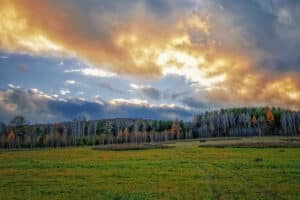It was a mixed bag of results, but according to the November LANDTHINK Pulse results, 35% of respondents would choose a farm(ette) or ranch(ette) to live on. Americans are moving to rural areas in ever-increasing numbers, reflecting their increased desire to seek out more space, embrace entrepreneurial opportunities, and take advantage of a lower cost of living. Whether you’re retiring, starting on a farm or ranch, or escaping the rat race, a farm or ranch can be your own special oasis. There are so many types of farms and ranches and ways to live the farm or ranch life, making this lifestyle appealing to many.
Last month, the November Pulse asked: If you had to choose a type of land to live on, regardless of size or location, which would it be?

Outside professional agriculture, the terms “ranch” and “farm” often get tossed around interchangeably, but they refer to distinct types of operations. A ranch is a specific type of farm that is focused on herding and raising hoven animals, usually cattle or sheep. The primary purpose of a ranch is breeding, raising and selling livestock, although there might be a small farm or garden on the land. A farm on the other hand, is used for agricultural purposes. There are different types of farms, such as dairy farms and crop farms. Large acreage farms and mega-ranches come with a hefty price tag and for many owning and operating a full-on farm or ranch just isn’t feasible. The good news is, there is a smaller and more pocketbook friendly alternative.
Most small acreage farms or ranches (often called ranchettes or farmettes) are rural properties, usually under 40 acres, where part of the land is used for agricultural purposes, including crops, livestock and horses. Buying a farmette or ranchette can be desirable for people looking for a mix of lifestyle benefits, potential income generation, and a connection to the land, especially for those seeking a semi-rural living experience with the ability to raise some livestock or grow produce while still maintaining a manageable property size.
Reasons to Invest in a Farmette
Wholesome family activities: Farmettes are often family-owned and operated, with the owners actively involved in day-to-day activities. This provides a hands-on learning environment where children can directly engage with nature, learn about food production, care for animals, and develop a sense of responsibility through gardening, livestock tending, and other farm chores, all while enjoying the outdoors and building strong family bonds through shared activities.
Environmentally friendly practices: Many farmettes are considered to be organic because of their smaller size and focus on producing a diverse range of crops for local markets, often utilizing sustainable practices that align with organic farming principles like composting, crop rotation, and minimal chemical use.
Increase your income: Farmettes can generate income from selling fresh produce, eggs, meat, honey, and services like agritourism activities like farm stays or workshops, educational programs, or direct-to-consumer sales.
Reasons to Invest in a Ranchette
Peace and privacy: Because of their proximity to metropolitan areas, ranchettes are the perfect location if you’re looking for the peace and privacy of the country with benefits of a nearby city. They also allow for more privacy, security, and independence.
Self-sufficiency: Ranchette owners value the ability to produce their own food or resources, whether through gardening, raising livestock, or harvesting timber. These days sustainable living has a large appeal and is often times becoming more and more necessary. This self-sufficiency can lead to a more sustainable lifestyle and reduce reliance on external sources.
Views and scenery: With landscapes that often stretch as far as the eye can see, ranchettes redefine the meaning of spacious living, providing the ideal backdrop for a buyer’s grand visions. Ranchette offer beautiful views of hills, fields, woods, lakes, and rivers. They also have access to natural resources like water, plants, and wildlife.
Pride of Ownership: The weather can be unpredictable at times and a lot of hard work goes into properly maintaining a ranch. It takes a lot of sweat equity to improve and manage a ranchette. Ask any owner about their land and they’ll wax poetic about the grazing, the scenery, and the hard work that comes with owning a ranch property.
It was a tie for second place, with 17% of respondents indicating they would choose waterfront land and 17% indicating they would choose rural undeveloped land to live on.
Whether it’s the majestic ocean, the serene ambiance of a lake, or the tranquil flow of a river, waterfront properties hold a unique appeal. There are several reasons why waterfront real estate could be an opportunity worth discussing. When it comes to investing in real estate, waterfront properties often stand out as high-reward investments, owing to their long-term potential. Additionally, the opportunity to wake up to panoramic water views and experience nature’s captivating beauty up close is a privilege that few can resist. Waterfront properties offer more than just a stunning view; they provide unique opportunities for community engagement and a lifestyle deeply connected with nature.
Rural undeveloped land is an investment like no other. Undeveloped land, often called raw land, is a vacant area without any public utilities, buildings or even driveways. Typically, undeveloped land is in rural areas, found off county roads and could be the place to build your dream home. It can be used for many other purposes as well, including:
- Recreation and Relaxation
- Agriculture & Farming
- Long-Term Investment
- Tax Benefits
- Freedom and Privacy
- Leasing Opportunities
Whether it’s a farm or ranch, waterfront land or rural undeveloped land, living on acreage have many benefits. If you’re considering buying land, it’s important to have a plan in place for the land and how you’ll finance the purchase. Knowing what to expect ahead of the purchase will help you save time and money. Make sure you factor in all costs and all the steps you’ll need to take to purchase, prep and use the land the right way.
Do you have a suggestion for next month’s Pulse question? Submit your question and we might choose yours!
This content may not be used or reproduced in any manner whatsoever, in part or in whole, without written permission of LANDTHINK. Use of this content without permission is a violation of federal copyright law. The articles, posts, comments, opinions and information provided by LANDTHINK are for informational and research purposes only and DOES NOT substitute or coincide with the advice of an attorney, accountant, real estate broker or any other licensed real estate professional. LANDTHINK strongly advises visitors and readers to seek their own professional guidance and advice related to buying, investing in or selling real estate.










Add Comment